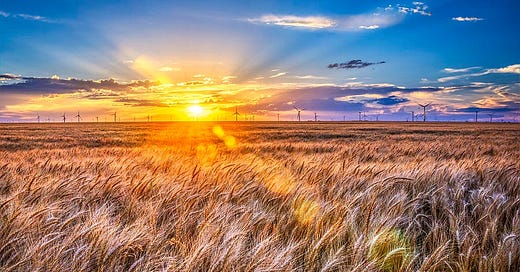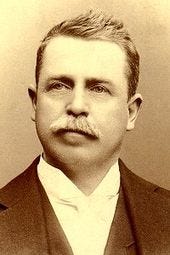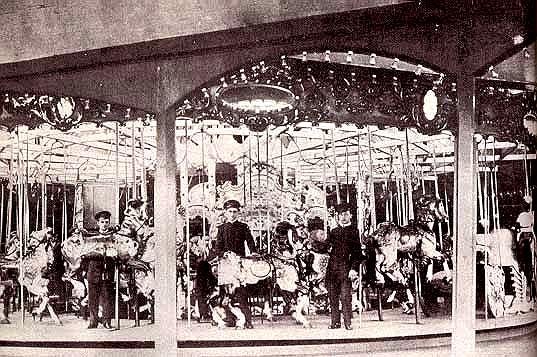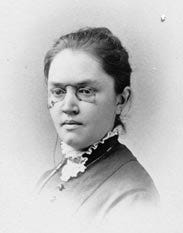[This is a re-post from the last 4th of July, and maybe from the year before, too. It’s a good American story, though, and deserves to be repeated.]
Sam Ward [1848-1903] had an enviable position as the organist at Grace Episcopal Church in Newark, New Jersey in 1882.
Not only was he to play a massive pipe organ on Sundays and other occasions, lead a 100-member choir in worship, and plan the hymnody for the year, but he was also expected to compose original pieces for the principal liturgies of the parish on Christmas, Epiphany, Easter, Pentecost, and other times of special import.
So, with music so much on his mind, it is not surprising that even on a day off spent at Coney Island eating hot dogs and riding the amusements, the calliope on the merry-go-round would inspire him to compose a piece of music as he rode the side-wheel ferry back to Newark.
It was a literal “off-the-cuff” composition as, according to the apocryphal story, the only item on which he could scribble his composition was the detachable, starched, linen cuff of his shirt. The result was named “Materna”, after its opening lyric.
O mother dear, Jerusalem,
When shall I come to thee?
When shall my sorrows have an end,
Thy joys when shall I see?
O happy harbor of the saints!
O sweet and pleasant soil!
In thee no sorrow may be found,
No grief, no care, no toil.
No murky cloud o'ershadows thee,
Nor gloom, nor darksome night;
But every soul shines as the sun,
For God Himself gives light.
There lust and lucre cannot dwell,
There envy bears no sway;
There is no hunger, heat, nor cold,
But pleasure every way.
Thy gardens and thy gallant walks
Continually are green;
There grow such sweet and pleasant flow'rs,
As nowhere else are seen;
Quite through the streets, with silver sound,
The flood of life doth flow,
Upon whose banks on every side,
The wood of life doth grow.
There trees forevermore bear fruit,
And evermore do spring,
There evermore the angels sit,
And evermore do sing.
Jerusalem, my happy home,
Would God I were in thee!
Would God my woes were at an end,
Thy joys that I might see!
It’s rather typical for late-19th century treacle, and even made its way into The Episcopal Church’s hymnal for a time.
Eleven years after Materna’s composition, Katherine Lee Bates [1859-1929], an English professor at Wellesley College, traveled by train from Boston to Chicago for the World’s Columbian Exhibition, and then across the vast plains and mountains to Colorado Springs to spend the summer lecturing.
[An aside: Bates is recognized as one of the strong historical proponents of American Literature, encouraging it to be regarded as its own field of study rather than secondary to British and European literature. She was an unapologetic Emersonian, and God bless her for that.]
It was an exhilarating journey for her, as it is for most people from the Northeastern United States when they first see what the rest of the country looks like, with its majestic mountains, purple in the morning haze, the great fields of amber grain waving in the wind, and the gloriously spacious skies.
In her journal, Bates noted:
One day some of the other teachers and I decided to go on a trip to 14,000-foot Pikes Peak. We hired a prairie wagon. Near the top we had to leave the wagon and go the rest of the way on mules. I was very tired. But when I saw the view, I felt great joy. All the wonder of America seemed displayed there, with the sea-like expanse.
She even wrote that, for the first time, she understood what is was to be an American.
Since Bates’ late father had been a prominent Congregational minister, the poem that she wrote about her revelation was published in a Congregationalist weekly newspaper and proved popular for a time, often being recited at patriotic occasions.
As was the practice of the day, there were attempts to match the poem’s words to music, as it is an easy rhythmic setting, but none of those took hold until a music publisher dusted off a copy of Ward’s Materna and managed to cross the diamond with the pearl. The result, of course, is the patriotic song that is familiar to all of us, the final and most familiar version of which would be published in 1913.
1 O beautiful for spacious skies, for amber waves of grain; for purple mountain majesties above the fruited plain! America! America! God shed His grace on thee, and crown thy good with brotherhood from sea to shining sea!
2 O beautiful for heroes proved in liberating strife, who more than self their country loved, and mercy more than life! America! America! God mend thine every flaw, confirm thy soul in self-control, thy liberty in law.
3 O beautiful for patriot dream that sees beyond the years thine alabaster cities gleam, undimmed by human tears! America! America! God shed his grace on thee, and crown thy good with brotherhood from sea to shining sea!
[Frankly, I often wish it were the National Anthem, as I think it more lyrical than Francis Scott Key’s work. However, its obvious monotheistic references and theme would be off-putting to the non-theistic dullards of contemporary society.]
Ward and Bates would never meet. Regrettably, Sam Ward did not live to see his work immortalized in this form, but I hope he would have been pleased to know the tune was published in The Episcopal Church’s hymnals of 1940 and 1982, where it currently appears as hymn #719, and is still sung in most parishes even unto our own day.
Not bad for a day at Coney Island.
Lyrically, I’m drawn to Bates’ expression “God shed his grace on thee”. It is an apt theological image and speaks to the particularity of the American character, of which Bates was always a champion.
We receive that which is placed before us, whether of grace or nature, that enables us to find our way based on faith. Often, we find ourselves in a harmonic convergence of parts and portions of existence, as with the music of Ward and the words of Bates, with which we build a newer, deeper experience.
Continue to shed your grace, Lord. We’ll continue to weave it into something worthy of those who have been so honored.
From the “old” Book of Common Prayer [1928], The Collect for Our Country:
Almighty God, who hast given us this good land for our
heritage: We humbly beseech thee that we may always prove
ourselves a people mindful of thy favor and glad to do thy will.
Bless our land with honorable industry, sound learning, and
pure manners. Save us from violence, discord, and confusion;
from pride and arrogance, and from every evil way. Defend
our liberties, and fashion into one united people the multitudes
brought hither out of many kindreds and tongues. Endue
with the spirit of wisdom those to whom in thy Name we entrust
the authority of government, that there may be justice and
peace at home, and that, through obedience to thy law, we
may show forth thy praise among the nations of the earth.
In the time of prosperity, fill our hearts with thankfulness,
and in the day of trouble, suffer not our trust in thee to fail;
all which we ask through Jesus Christ our Lord. Amen.
May you have a fine holiday, everyone. As ever, thank you for reading and indulging your curiosity in these pages. Our mission of faith and education will continue next week, but we will have an extra post later today or tomorrow.







This story never gets old. The prayer for our country prompted me dust off my copy of the 1928. There shouldn't be any dust on that prayer book!
Fantastic story! Today I’ll be thinking fondly of our celebration of Clemstock 10 years ago.